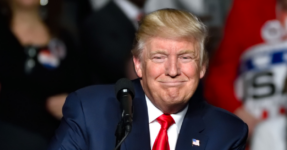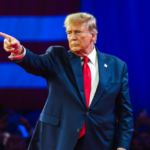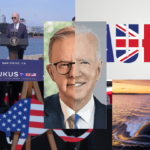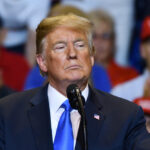Australia Under Trump: Will We Continue to Be the Lapdog of the United States?

Australia has maintained strong ties with the United States for generations – a relationship deeply rooted in our shared Anglo-Celtic heritage, predominantly Christian belief system and history of colonialism.
And despite our former Australian Prime Minister Paul Keating’s push for our nation to develop closer relations with South-East Asian countries in preference to far off jurisdictions like the United States and United Kingdom, our nation has made ourselves dependent on those nations – following them into illegal invasions (invariably in Muslim nations such as Iraq and Afghanistan), all-but begging for favourable trade arrangements, and creating pacts such as AUKUS which jeopardise economic ties with some of our biggest trading partners – including the nation with which we do the most trade, China.
Dictator on Day One
Australia was ‘cosy’ with the Trump administration during his last presidency— despite his stance against freedom of speech by those that refuse to toe his line, the divisions he created by way of knee-jerk policies such as his ‘Muslim ban’, his anti-abortion stance and his inability to deal with the COVID situation – suggesting on stage that injecting disinfectant could do the trick – to the ire of those within his administration, many of whom resigned in protest to his short-sighted and, at times, absurd and even offensive and anti-democratic directions.
This ‘man’ who describes those who do not agree with him as the ‘enemy from within’, calling for their targeting, prosecution and cancellation, is now the president of the most powerful nation in the world – and his promise to be ‘dictator on day one’ as well as to introduce tariffs on all foreign nations and create an extreme nationalist (also known as fascist) regime is cause for concern.
With all of that said, let’s take a look at past relations with this ‘wannabe dictator’ and what it could mean for our own nation.
Past Relations During Trump’s Last Administration
During the last Trump administration, between 2017 and 2021, significant events occurred that shaped the relationship between Australia and the US for years to come.
Firstly, Trump disagreed with Turnbull in a previously-held agreement that aimed to allow asylum seekers into the US who are currently on Nauru and Manus Island in detention centres — all of which spurred from Trump’s travel ban. Trump suspended the entry of Syrian refugees and reduced the number of allowed refugees into the country from 2,000 to just 1,250 — people of which he was directly responsible for basically imprisoning on islands and refusing to be allowed into the country.
Secondly, Turnbull announced publicly that he felt confident the United States would uphold their part in the ANZUS Treaty if Australia was under threat by North Korea and ballistic missiles in 2017. The ANZUS Treaty, a collective agreement between New Zealand, Australia, and the United States, is a cornerstone of Australia’s security and defence policy. It requires the parties to ‘resist armed attack’ and consult with one another on security matters, underscoring the importance of the US as a security partner for Australia.
Furthermore, the United States permanently exempted Australia from the 25% steel tariff, making Australia one of only four countries to acquire an exemption.
Despite one or two ‘good’ outcomes for Australia while Trump was President during his last administration, overall, having this horrific leader as the person in charge of the United States — a country with which Australia had an excellent record of security agreements, partnerships, allies during previous wars, military aid, and trade relationships historically — will be a disaster for the Pacific as a whole.
During his last presidency, only 29% of Australians felt confident in Trump as President, in contrast to 87% with Barack Obama, with just 55% of Australians feeling that the US could act ‘responsibly’ in worldwide matters.
An overall distrust in the US, and the now-elected President, not only indicates the public’s dismay in how the United States has continually put their faith in the hands of a hateful leader, but foreshadows how the Australian government, and country as a whole, can directly suffer from a nonsensical, extremist, and fascist president.
How Australia Could Be Affected by Trump’s Reign
The similarities between Trump and Hitler are apparent — and now that he has officially been elected as the next POTUS, Australia must re-look at all of their agreements, deals, and partnerships with the United States to see just how much we will be affected by this horrific choice.
Democracy
Australia is a representative democracy that listens to its people. On the other hand, the US is now a country that will be run by a tyrannical dictator-like figurehead who poses a threat to everyone’s safety within the country and relationships held with countries like Australia.
Trump has said he would not use dictatorial means ‘except on day one’, aiming to gain revenge on his political opponents — where one can only assume he means Democrats and ‘radical left thugs’ — that could lead to mass violence within the country. As a commander-in-chief, he has threatened to use the National Guard or military to subdue his enemies.
For Australia, this means that they could now have to work hand-in-hand with the likes of a fascist who wants to have unlimited power and military personnel to control and ‘attack’ whoever he sees fit. This will make it extremely difficult for Australia to collaborate with the US on military plans and foreign policy.
Climate
Trump had already announced before he was elected that he planned to remove the US from the much-needed and groundbreaking Paris Climate Accord — again. He has been a massive denouncer of climate change, claiming that it is ‘one of the greatest scams’. Not only is he a vocal opponent of anything climate-related that admits greenhouse gases are causing the world to slowly erode, but he has also made it widely known that he wants to eliminate offshore wind projects and other emissions reduction efforts.
Australia is currently a member of an umbrella group of countries fighting climate change and the crisis worldwide. The Australian climate change minister, Chris Bowen, is a big proponent of creating radical climate change bills that address dealing with fossil fuels and slowing global greenhouse gas usage.
Given the US’s significant role as the world’s second-largest greenhouse gas producer and its current leadership’s stance on climate change, Australia may face substantial challenges in negotiating global efforts to reduce greenhouse gas emissions and phase out fossil fuels.
Trade
Trump is clearly against any type of free trade. He is a greedy businessman who wants to make a deal out of anything and everything that he can. The new oppressor will impose a 10% tariff intended to lower the average US household income—or so he claimed—but these tariffs will only make the rich even richer. At the same time, the poor will be unable to afford goods they previously could.
Foreign trade and tariffs directly affect Australia’s exports. Although Australia does not directly rely on trade with the United States, a huge chunk of its imports and exports go through China—a country that will now face a 60% tariff on all exports and a 100% tariff on vehicles. If China’s economy takes a huge downturn due to the massive jump in fees, it will directly expose Australia and lead to a possible trade war between Asia and the US. This could have significant implications for Australia’s economy and trade relationships.
AUKUS
Although Trump has not directly criticised the Aukus tripartite agreement between the United Kingdom, United States, and Australia, he has been openly critical of NATO, showing how his volatility and uncertainty could relate to any agreement previously held — his instability makes his words simply untrustworthy.
Despite Australia’s deputy prime minister Marles showing hope that Trump will keep his word (which means nothing), Trump’s former national security advisor, Bolton—who is now a huge critic of the now-current President yet again—has stated that the deal could be in grave danger.
The Aukus Indo-Pacific strategy was put in place to share information, materials, and equipment between the UK, US, and Australia regarding nuclear-powered submarines, Virginia class submarines, and equipment transfers for use in Australia’s SSN submarines. If the deal goes south, it could lead to a lack of safety in the region and a possible decline in the current rise in hypersonic and AI military systems.
Australia Looks to the United States
One of the biggest concerns with Trump being elected President is how Australia will follow. Australia has a history of ‘copying’ or mimicking the framework of the US, a country that was previously thought of as advanced and a leader in multiple aspects. This can easily turn into emulation, which leads to destruction.
Australia had always considered the United States one of their biggest allies ever since Prime Minister Curtin stated that ‘Australia looked to America’ back in 1942. But, since then, the country’s heavy reliance on US-backed support has led to our country turning a blind eye to some of the most hateful, anti-democratic, and discriminatory policies that have ever existed in the first-world country.
Australia has turned a blind eye to Trump’s previous xenophobic and divisive policies, partially out of fear that the volatile President could sever ties with the Pacific country, such as cutting off trade, backing out of AUKUS, and reducing military support in the Pacific region.
But the concerning question that plagued Australians when he took control in 2017 and again now is just how far the new leader is prepared to take the United States—and is Australia going to follow down its divisive and destructive path?






